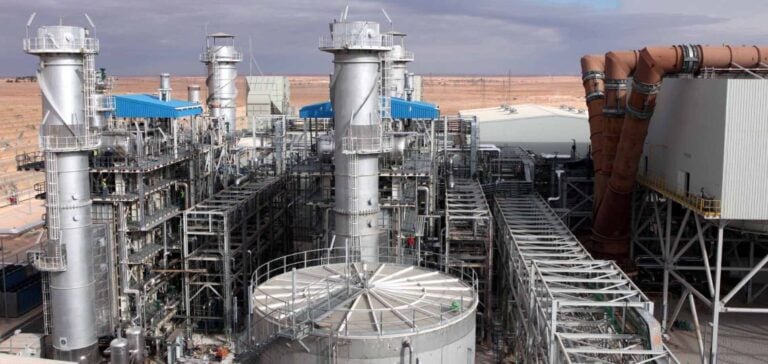Algeria’s state-owned hydrocarbons company, Sonatrach, officially launched on December 1 a new strategic phase of operations at the Hassi R’Mel gas field, the country’s largest natural gas reserve and one of the most significant in Africa. This project, titled “Boosting Hassi R’Mel — Phase III — Step 2,” is a critical lever for ensuring the continuity of national production.
The Hassi R’Mel field, which provides approximately 26% of Algeria’s daily gas output, has already seen about 80% of its recoverable gas extracted through two prior projects completed in 2004 and 2009. In this latest phase, Sonatrach plans to install and operationalize three gas compression stations by 2027, aiming to extend the field’s viability and extract additional volumes.
Projections indicate that the project will enable the recovery of approximately 121 billion cubic meters of gas, in addition to 7 million tons of condensates and 3 million tons of liquefied petroleum gas (LPG). These results will support the current levels of gas production while meeting growing domestic and international market demands.
Strategic Partnerships and Investments
To execute this ambitious project, Sonatrach has partnered with leading companies in the oil and gas sector. Baker Hughes and Tecnimont have been selected to provide technical expertise. The total cost of this initiative is estimated at $2.3 billion.
Beyond this specific project, Algeria plans substantial investments in hydrocarbons over the next five years. In December 2023, Sonatrach announced a comprehensive investment program of $50 billion for the 2024-2028 period, including $36 billion dedicated solely to production and exploration. These investments aim to increase annual output to 200 billion cubic meters by 2028, up from the current 137 billion.
Strategic Objectives for Europe and Africa
Algeria has clear ambitions: to solidify its role as a key energy supplier not only on the domestic market but also regionally and internationally. In Europe, where demand for natural gas remains strong, particularly in the context of the energy transition, Algeria positions itself as an indispensable player.
Through the ongoing projects at Hassi R’Mel, Sonatrach aims to both honor its international commercial commitments and reinforce Algeria’s status as an energy leader in Africa. This strategic positioning is part of a long-term vision to diversify and sustain revenue from natural resources.





















